
|
Pinocchio
(1940)
In possibly the greatest of all Disney animated cartoons
(Disney's second full-length animated film (following Snow
White and the Seven Dwarfs (1937)) - a morality tale and
coming-of-age story about a simple-minded wooden Pinocchio boy with
an impetuous curiosity, who overcame temptation and learned courage
in the face of fear and danger, but first had to encounter terrifying
and frightening adventures:
- the storybook fairy tale opening was told by Jiminy
Cricket (voice of Cliff Edwards) in a library, while singing the
memorable "When You Wish Upon a Star"; he described his
journey to the dwelling of a kind old Tuscany, Italy woodworker
or carver named Geppetto (Christian Rub) who lived with his two
pets: black and white Figaro the cat, and flirtatious Cleo the
goldfish; he also performed a high-wire act on a violin string
- Geppetto made a wish (on an evening falling star)
that his hand-made wooden marionette puppet Pinocchio (voice of
Dick Jones) would someday become a real boy
|
Jiminy Cricket with Pinocchio - His Official Conscience
|

Storybook Opening
|
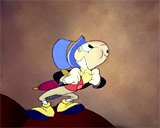
"Give a Little Whistle"
|
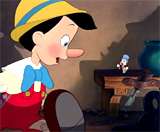
"...Let your conscience be your guide"
|
- the granting of Geppetto's wish by the Blue Fairy
(Evelyn Venable) brought Pinocchio to life as a live puppet;
Pinocchio was told he had to prove himself in order to become a real boy
by being "brave, truthful, and unselfish"
- the Blue Fairy also appointed
Jiminy Cricket as Pinocchio's official conscience; Jiminy Cricket
taught Pinocchio to whistle and then sang the advisory "Give
a Little Whistle" to become Pinocchio's conscience: "...Take the straight and narrow
path / And if you start to slide / Give a little whistle, give
a little whistle / And always let your conscience be your guide"
- on his way to school, Pinocchio was duped by the
wily, smooth-talking, wicked fox Honest John Worthington Foulfellow
(Walter Catlett) (with his mute, simpleton feline sidekick Gideon
or "Giddy" the Cat), enticing him to become an actor on the stage and join the marionette
show of traveling marionette master Stromboli (Charles Judels),
a large bearded Italian puppet-maker; as they led him away, they
sang the delightful song "Hi-Diddle-Dee-Dee (An Actor's Life
for Me)": "Hi-diddle-dee-dee
An actor's life for me A high silk hat and a silver cane A watch
of gold with a diamond chain Hi-diddle-dee-day An actor's life is
gay It's great to be a celebrity An actor's life for me!....Hi-diddle-dee-dum
An actor's life is fun...Hi-diddle-dee-dee An actor's life for me
A wax mustache and a beaver coat A pony cart and a billy goat Hi-diddle-dee-dum
An actor's life is fun You wear your hair in a pompadour You ride
around in a coach and four You stop and buy out a candy store An
actor's life for me!"
- Pinocchio became the star attraction while performing
for Stromboli, including the song "I Got No Strings" where
he outshone other normal wooden European marionettes, although he
was locked up in a birdcage each night to keep him from escaping;
Stromboli's objective was to tour with Pinocchio around the world
and then chop him up into firewood
- the Blue Fairy came to Pinocchio's
aid; he lied about not going to school, and his nose grew long from
so many lies that it became as long as a tree branch where birds
could perch; she advised him: ("A lie keeps growing and growing
until it's as plain as the nose on your face...Always let your conscience
be your guide"); Pinocchio was given a second chance and released
after being warned about misbehaving
- a second time, Pinocchio was
led astray by Foulfellow and Gideon, and transported by a "Coachman"
to Pleasure Island (without rules or authority figures), where temptations
abounded
- the sinister and scary Pleasure Island amusement
park was a symbol of debauched and unbridled hedonism; it was notorious for letting delinquent, bad
and naughty boys such as Lampwick (Frankie Darro), one of Pinocchio's
new friends, to break rules, smoke cigars, gamble, play pool, commit
vandalism, and get drunk on beer; due to his misbehavior, bad boy
Lampwick began to sprout donkey ears, hooves and a tail, and bray
like a donkey - he frantically cried out for his Momma - the donkeys
were ultimately to be sold as slave-labor pack animals (jackasses)
in the salt mines or in circuses
- fearing for his own life when Pinocchio was nearly-transformed
- he began to grow large ears and a tail, but was able to escape
from the island with Jiminy's assistance; in the workshop, the two
learned that Geppetto had gone looking for them to rescue Pinocchio
from Pleasure Island; on a raft-sailboat at sea, Geppetto's attempt
at rescue ended when he was swallowed by the scary Monstro, the Whale,
and was alive in the cavernous belly of the satanic black, terrible beast
- Pinocchio managed to be swallowed to reunite with his father, and then schemed
to light a fire inside the whale to force them to be expelled with
a giant sneeze; they were propelled out of the whale's mouth,
and escaped on their raft from the angry's whale's pursuit; the self-sacrificing
Pinocchio saved his father from drowning, but ended up appearing
dead on the shore
- back at home, Pinocchio was
magically resurrected by the Blue Fairy for his good deeds and rewarded
for proving himself by being transformed into a real boy ("Awake,
Pinocchio")
- in the conclusion, Jiminy Cricket was also rewarded
with a gold badge by the Blue Fairy for serving as Pinocchio's conscience
|

Geppetto with Hand-Made Wooden Puppet

The Blue Fairy Transformed Pinocchio Into a Live Wooden
Puppet

Pinocchio Led Astray by Honest John Worthington Foulfellow
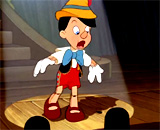
"I've Got No Strings"
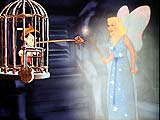
Nose-Growing Pinocchio Lying to the Blue Fairy


Lampwick (Transforming into a Jackass or Donkey)
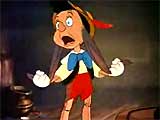
Pinocchio's Near-Transformation
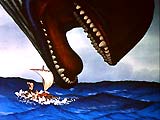
Geppetto's Raft and Monstro the Whale
|










